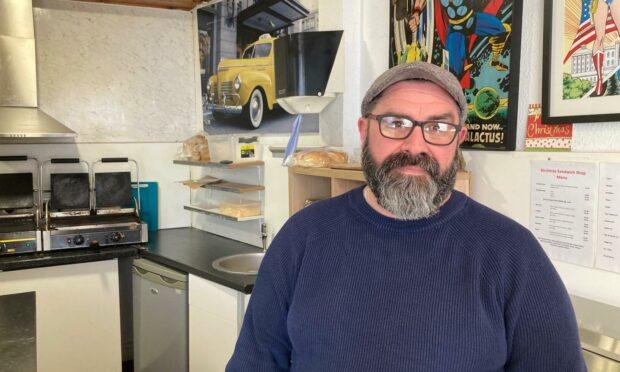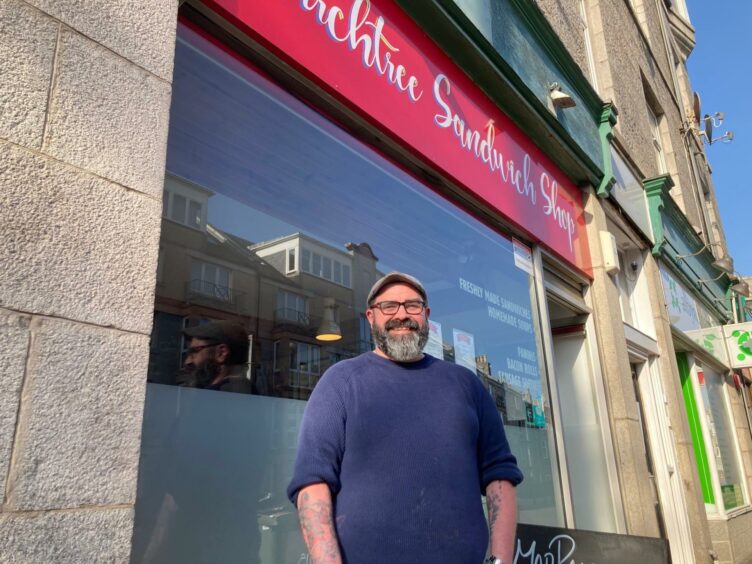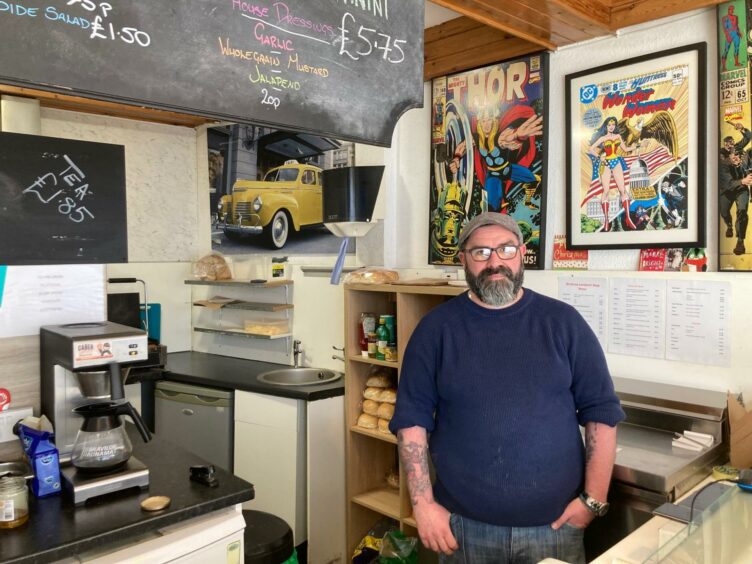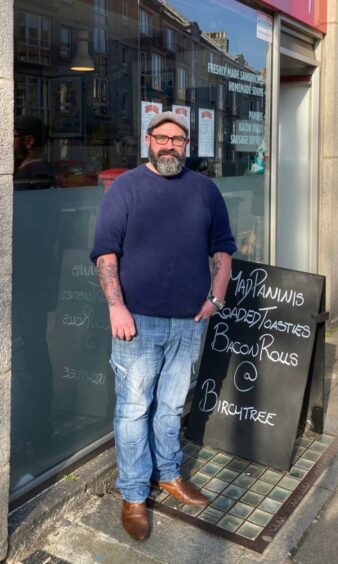Terry Birch stands behind his sandwich bar, arms out.
“I’m on my own,” he says, voice cracking with emotion.
The gesture is one of surrender, but Terry is not there yet.
Instead, he is fearful, and a little bit angry.
Fearful that the sandwich shop on Union Grove that was supposed to be his nest egg is under threat from bills he can barely cover.
Angry that no matter how hard he works, he can’t seem to dig himself out of danger.
“I spend more time robbing Peter to pay Paul,” the 44-year-old says. “I’m making money to pay my bills, not to pay my profit.”
Terry lists just some of the cost increases the Birchtree Sandwich Shop has faced because of inflation over the past few months, each one of which makes his business less profitable.
The paperboard takeaway boxes for the Deliveroo orders he relies on – up by one third. The gas to heat his water – up by three-fold. Toilet roll – up from £1 to £1.50
At the same time, outstanding debts to his suppliers are not going away.
“I can barely sleep,” he says. “I wake up in the morning and I don’t want to come in to work.”
Customers feel the heat
Recently, another threat has risen – the flow of customers through his doors that sprung back after lockdown ended is once again narrowing.
Terry knows he can cover costs for the day if 20 people walk through his door. But this month, numbers have crashed.
The reason? Cost increases that have been impacting him for months are starting to be felt by customers.
“There’s so much uncertainty out there right now,” Terry says, pointing out the door. “For everyone. No one knows what their gas bill or their electric bill is going to be.”
The wider picture
Terry’s story is a microcosm of what is happening to Aberdeen’s bars, cafes and restaurants right now.
Many venues racked up debts to suppliers with the expectation that the post-Covid landscape will see a return to normal.
Instead, more obstacles have sprung up, every time kicking normalcy further down the road.
First, there were the supply issues that hiked up prices, and then rising energy costs. Now the war in Ukraine is set to push up energy prices further, and weigh heavily on people’s pockets.
Inflation is a constant threat. This week, new data showed that the cost of groceries was already up more than 5% on a year ago.
It is takeaways such as Terry’s that are impacted the most from declining disposable incomes.
“People have to manage their household budgets, and inevitably that means they will look to cut back on things they feel they can they can do without,” says Leon Thompson, UKHospitality Scotland executive director.
“Takeaways is one area where consumers are saying they’re going to do less of in order to save some money.”
The threat to takeaways
In response, restaurants are cutting back on operations to save on costs. Terry, for example, has already trimmed his opening hours by the equivalent of a day out of the week.
But, in turn, this makes it even harder for a business to recoup the costs of the pandemic.
Ultimately, says Leon, the recovery from the pandemic will take longer, a situation that will “certainly force some business under”.
Terry frames the issue another way – the slow crush of hope.
“Every time you think you’re going get out of it,” he says. “The other week, I felt for a moment that things were going back to normal. But they didn’t. It’s four steps forward, three steps back.”
Tough times ahead
The immediate outlook is dispiriting. Last month, the owner of Market Street burger joint Bangin’ Burgers blamed a lack of footfall through the door as one of the reasons for closing down permanently.
With financial pressures on the public only set to rise over the next few months thanks to inflation, businesses will find it even harder to make money.
“We’re in limbo,” Terry says.
“Pubs, takeaways, cafes – we’ve all got the same problem. Electricity prices are going up so our prices are going to go up. And that comes out of someone’s pocket who is already spending more money on gas, electric and petrol. Where does it all stop?”
But for Terry, putting up prices on his signature steak paninis is the last thing he wants to do. He is intimately acquainted with the kind of pressure his customers are going through in paying their own bills.
It’s the kind of pressure that pushes people to breaking point.
“I don’t want to put any more pressure on anyone else out there,” he says, his voice cracking. He stops to compose himself before stating simply: “I know what it’s like for me.”
‘I just want to pay my bills’
Terry is happiest when he is cooking, or as he puts it, “playing with other people’s food”. The past two years have been far from happy.
But he is determined to keep fighting to emerge on the other side, whenever that long-awaited normal returns.
He will do it for himself, the staff that have stood by him and for his customers.
“All I want to do is pay my bills and live my life,” he says.
“I don’t want the stress of worrying if I’m going to make money the next day. I want to know that there’s going to be a certain number of customers walking in the door, and that are not going to be counting their pennies to see if they can afford to buy something.”



